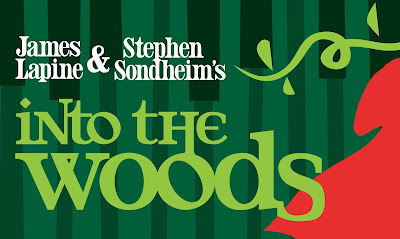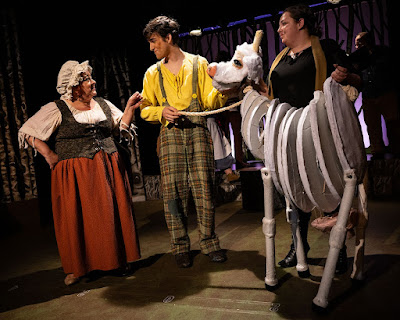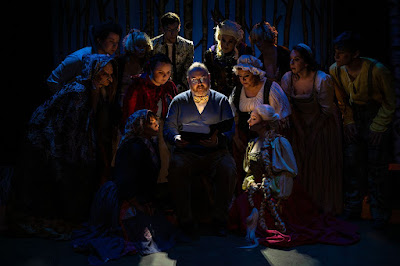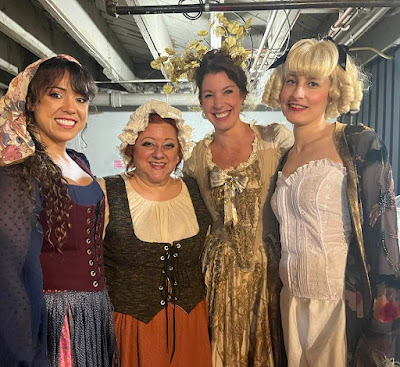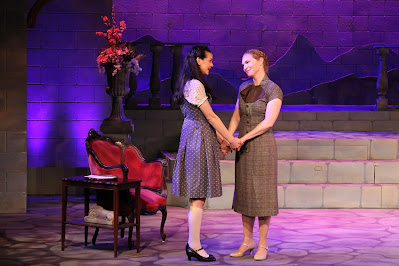Once upon a time...
In the classic fairy tales of "Cinderella," "Jack and the Beanstalk," "Red Riding Hood" and "Rapunzel," a life of "happily ever after" was pretty much guaranteed.
Idyllic summers.
Lavish costume balls.
Handsome princes.
Beautiful maidens.
Singing birds.
Typical flights of whimsy.
Not a care in the world.
Oh, really!
Think again!
And, oh yes, be careful what you wish for.
Stephen Sondheim and James Lapine's celebrated, deliciously wicked two-act musical "Into the Woods," first produced on Broadway, back in 1987, turns all that good cheer and happiness completely upside down and back again, in favor of something more mysterious, disturbing, gruesome, wilted and spellbinding.
There's death.
There's bloodshed.
There's fantasy.
There are magic beans.
There are spells.
There are mashups.
There are transformations.
There are bizarre scavenger hunts.
There are consequences.
There's not one, but two giants.
There are romantic dalliances in the woods.
There's also an oversized puppet called Milky White.
Ah, what fun!
Ah, what joy!
Ah, what drama!
Ah, what merriment!
Ah, what hell!
That said, the tangled, twisted and hypnotic world of make-believe has never been more appealing, alluring and eye-catching.
Case in point: The Castle Craig Players exhilarating, fanciful, breezy production of "Into the Woods."
Brash.
Acerbic.
Malevolent.
Vigorous.
Potent.
Outrageous.
There's lots to enjoy about this colorful, peppy, angst-ridden revival from Erin Campbell, Nicole Zolad and Erin Aldrich's gleeful, contagious, richly cemented, hilariously orchestrated comedic turns as Stepmother, Florinda and Lucinda to Griffin Kulp's seriously wild dual portrayals of the flesh-eating Wolf and Cinderella's narcissistic Prince Charming to Desi Amato's mesmerizing, showstopping, beautifully textured portrayal of The Wicked Witch who, at the end of Act One is miraculously transformed from an ugly, hideous looking woman into a drop-dead, gorgeous, fashionista.
All five have the right look, the right mindset, the right attitude, the right voice, the right body language and the right sound necessary to reenact the craftiness, content and stylization of this ground-breaking, now iconic material, as created by both Sondheim and Lapine.
As musical theatre, this production of "Into the Woods" also wryly exposes the fun, the fantasy, the brashness, the catastrophes, the sexiness, the charm and the over-the-top theatrics of several fairy-tale characters who, much to the delight of its creators, don't get that happy ending they so longed for.
Then again, that's the point of this sprawling, ingenious musical that finds breathy bewilderment in the mix-ups and collisions of characters who accidentally find themselves misplaced in someone else's story. It's a cheeky concept that fuels the narrative with full-throttle commitment, command, leap and impact.
How it all plays out - and play out it does - scene by scene, song by song, twist by twist, turn by turn - gives this savvy and immersive revival of "Into the Woods" its heartbeat, its pulse, its personality, its soul and its emotional center.
You laugh. You cry. You cheer. You grimace. You shake your head in wonderment. You clap. You stir. You embrace the musical's dark, involving moments. You revel in its many mysteries and surprises. You sit there spellbound never quite knowing what's going to happen next.
Staging "Into the Woods," Ian Galligan ("Company," "Gypsy," "Cabaret," "Grey Gardens," "Oliver!") delves deeply into the intricacies of Lapine's book, its rhythmic wordplay, its quirks, its beats, its pauses, its pulses, its sexual innuendo and its acerbic underbelly.
He creates. He moves. He embellishes. He enlightens. He addresses. He advances.
As "Into the Woods" takes flight, he also accentuates the gloom and doom of the author's vision, its idiosyncratic heartbeat, its atypical language, its dicey predicaments, its playful paradoxes, its doomed couplings, its obsessions, its cowardice, its romanticism and its unfortunate, unhappy twists of fate.
Better yet, Galligan is also pretty much his own man.
Directorially, he takes chances. He tries things differently. He's a free spirit brimming with great ideas and concepts that place him at the top of his game.
Here, as in other productions he has staged for Castle Craig Players, he knows exactly how to cast a show, what buttons to push, how to build and shape a musical, how to keep every one of his characters in the limelight, how to introduce a scene, a song, a dance and more importantly, how to make an oft-staged musical - in this case, "Into the Woods" - seem fresh, timely and brand, spanking new.
More importantly, Galligan takes a big, lavish Broadway musical and adapts it smartly to the small, intimate and immersive confines of the Meriden-based venue without losing any of the power, fantasy, boldness and wickedness associated with the two-act musical. Individual scenes are fast and fluid. Songs unfold with once-upon-a-time allure, humor and drama. Twisty and very dark directional strokes also rock the Sondheim/Lapine boat with cleverly constructed conceit, originality and flourish.
The idea of opening the musical with every one of the character's strategically placed around the storyteller holding the "Into the Woods" book that's about to be read out loud once the music starts works particularly well as does the ending of Act I that brings everyone back center stage as pages from the book fly about abruptly but stop midair, thus signaling the "to be continued" element of the story following intermission.
Musically, "Into the Woods" showcases Sondheim at his very best.
Winner of the 1988 Tony Award for Best Musical Score, the production unfolds through 32 carefully chosen, meticulously placed musical numbers that celebrate the genius of the composer, his now-iconic arrangements, his trademark syncopations, his intoxicating melodies, his catchy lyrics, his intricately dotted beats, rhythms, pauses, tilts and finally, his plummy, urgent verbiage.
In order of presentation, they are: "Prologue: Into the Woods," "Cinderella at the Grave," "Hello, Little Girl," "I Guess This Is Goodbye," "Maybe They're Magic," "Our Little World," "Maybe, They're Magic (reprise)," "I Know Things Now," "A Very Nice Prince," "First Midnight," "Giants in the Sky," "Agony," "A Very Nice Prince," "It Take Two," "Second Midnight," "Stay With Me," "On the Steps of the Palace," "Careful My Toe," "So Happy (Prelude)," "Ever After," "Prologue: So Happy," "Prologue: Into the Woods (reprise)," "Agony (reprise)," "Lament," "Any Moment," "Moments in the Woods," "Your Fault," "Last Midnight," "No More," "No One is Alone," and "Finale: "Children Will Listen."
To bring the "Into the Woods" score to life, Castle Craig Players has commissioned musical director Nick Ciasullo to recreate the lush complexity and eloquence of Sondheim's music. It's a task he greets with symphonic fascination, tilt, movement and deep, involved musical glow. Completely in sync with the thrill and punch of Sondheim's conceit, he allows the tangy musical score to breathe, beguile, astonish, entice, cajole and echo the pulsating notes, the haunting sounds, the merry skips, the delicious beats, the frenzied panting, the twisty malevolence and the wonderfully timed festering and gentleness the composer/lyricist has created. Not of a piece of the complex and complicated Sondheim puzzle is missing under Ciasullo's tutelage.
To keep the two-act musical both engaged and tuneful, Ciasullo (synthesizer 2) receives able assist from Jill Brunelle (keyboard), David Wilson (percussion) and Mya Chrzanowski (synthesizer 1).
In turn, there's plenty of payoff and satisfying thwack. The orchestrations unfold with pleasant directness and specificity. This being Sondheim, things are often intensely expressive and exceptionally intricate. Vocally, the cast understands Sondheim, gets Sondheim, appreciates Sondheim and wraps their vocal chops around the composer's clever, ironic and meticulously crafted music and lyrics. At times, however, the demands of the Sondheim score are so overwhelming, a flat note or loss of pitch or lyric interrupts the intended moment, but only fleetingly.
"Into the Woods" stars Desi Amato as The Witch, Griffin Kulp as The Wolf/Cinderella's Prince, Henry Tobelman as The Baker, Angela Citrola as The Baker's Wife, Kaite Corda as Cinderella, Benjamin Race as Jack, Dian Erikian as Jack's Mother, Erin Campbell as Stepmother, Nicole Zolad as Florinda, Erin Aldrich as Lucinda, Anna Conforti as Rapunzel, Chris Corrales as Rapunzel's Prince, Brooke Owens as Little Red Riding Hood, Jonathan Cohen as The Narrator/Mysterious Man, Cristin Daly as Granny/Cinderella's Mother, Bret Olson as Cinderella's Father, Jeffrey Rizzo as The Steward and Olivia DeFilippo as Milky White.
As the scary, twisted, vengeful and imperfect Wicked Witch, who, for fairy tale purposes, gets to shed her frightening image for a very glamorous one at the end of Act I, Desi Amato ignites "Into the Woods" with a totally invested, impactful performance chock full of refreshing intensity, command and energy that never once falters for a second. Throughout the musical, she has great fun casting spells, working magic, commenting on the doom and gloom of the story and wrapping her vocal cords around the wild and wicked Sondheim songs - "Stay with Me," "Last Midnight," "Our Little World," "Lament," "Children Will Listen" - that were originally created for Bernadette Peters on Broadway and Julia McKenzie in London's West End.
What's remarkable about Amato is how she puts her own individual stamp on the material, making it her very own rather than offering a copycat portrayal similar to that of her predecessors. Vocally, she's seasoned, capturing the wit, warmth, irony and mystery of both the Sondheim score and Lapine's cynical enchantress. So much so, one eagerly awaits her every entrance.
Chemistry is everything in this sort of Sondheim/Lapine frivolity and the well-matched, tremendously talented team of Henry Tobelman and Angela Citrola are completely engaging as the troubled Baker and the Baker's Wife. Given the many different levels, emotions, beats, twists and wrong turns they are required to make as the musical's childless couple, they grab hold of their characters, dig deep, and have great fun with pretty much everything they have to do on stage. To the benefit of all involved, including the audience, they get it right every time.
Vocally, they sing Sondheim's songs - "It Takes Two," "Moment in the Woods," "Maybe They're Magic," "No More," among others - with snap, vigor, passion and lyrical expression and precision. And as the story evolves, their keen, committed reenactment of an emotionally barren couple anxious to lift the Witch's curse of infertility (in the musical, the Witch caught the Baker's thieving father in her garden one-night stealing vegetables and six magic beans; to lift the spell, they must find "a cow as white as milk, a cape as red as blood, the hair as yellow as corn, the slipper as pure as gold") is effectively played out from start to finish until a cruel twist of fate (no spoilers here) midway through Act II changes everything forever.
They don't come any more magical than Benjamin Race who takes hold of the lead role of Jack as if he stepped right out of the pages of the 1734 English fairy tale "The Story of Jack Spriggins and the Enchanted Bean" and the subsequent 1807 retelling "The History of Jack and the Bean-Stalk."
Emotional, caring, childlike and curious, Race splendidly reenacts the "Beanstalk" drama with a natural gleam and polish that is exactly right for this retelling. Vocally, he's pitch-perfect delivering the melodious "Giants in the Sky" and the tearful "I Guess This is Goodbye" with the full, rich, voice and moist-eyed innocence that Sondheim intended for character and both musical numbers.
Cast in the important role of Jack's caring, overprotective and sometimes misunderstood mother, Dian Erikian - a performer who commands and holds your attention the moment she steps foot onto the Castle Craig Players stage - offers a sparkling, intuitive, inventive performance as captivating as that of Barbara Byrne who originated the part of Jack's mother in the original 1987 Broadway production.
As "Into the Woods" unfolds, her characterization is very real, very passionate and rife with humor, insight and motherly concern. There is never any doubt that she and Race are mother and son as their many scenes together are joyfully and sensitively rendered.
In the role of The Wolf, Griffin Kulp positively trumps confidence, coherence, charisma and a wicked sense of infectious glee while preening, slithering and affecting a "Cats"-like homage to the demon-like Mr. Mistoffelees (an added bonus under the directorial guidance of Ian Galligan) while sniffing out his luncheon and dinner prey in grand guignol fashion laced with playful dashes of wit, decadence and below-the-belt urges. It's a star turn by all accounts and one that comes front and center the moment Kulp starts to sing the seductive "Hello, Little Girl" to an unsuspecting Little Red Riding Hood.
Much later, Kulp reappears as Cinderella's Prince, a narcissistic charmer and ladies' man who capitalizes on his handsomeness, kingdom worship and overt, often impromptu sexual desires. He is joined by the equally talented Chris Corales, who plays the role of Rapunzel's dreamy Prince with the same sort of narcissism and preen that goes hand in hand with handsome fairy tale characters of royal lineage.
As "Into the Woods" casts its spell, you never once doubt the duo's over-the-top moves and motives which come full circle not once but twice when Sondheim's showstopping "Agony," - a song and Act II reprise - candidly recounts the duo's newfound and unobtainable lady loves and the ongoing misery and torture of their troubled romantic plights. Vocally, both Kulp and Corales drive the "Agony" duets forward hitting all the right notes with plenty of dash and comedic momentum, offset by over-the-top poses, rivalry and who can get to the center stage spotlight first.
Erin Campbell, cast in the role of Cinderella's Stepmother invests her characterization with the snap, zeal, zest and exaggeration envisioned by James Lapine when he first introduced "Into the Woods" to Broadway audiences 36 years ago. She's funny. She's wicked. She's evil. She's devious. She'll devour you in a heartbeat.
The actress also comes to the production with a clear and confident mindset that reveals strong acting technique, sharp enunciation and a clear and full singing voice completely in sync with the intricate musicality of Stephen Sondheim.
Cinderella's vile, black-of-heart stepsisters Florinda and Lucinda are played magnificently by Nicole Zolad and Erin Alrdich, who, like Campbell, step into the spotlight offering topflight characterizations completely entrenched in the melodramatic storytelling at hand. All three are appropriately vile spitting out insults, glaring at Cinderella and flouncing about in their festival ball gowns, enjoying their "Into the Woods" experience to the fullest.
As Cinderella, the versatile Kaite Corda finds real meaning, depth and purpose in her character's troubled fantasy world of "happily ever after" and "not so happily ever after." Yes, she snags the handsome prince. Yes, she reaps the benefits of a lush life in a grand and glorious palace. But underneath, she still enjoys cleaning and yearns for something much more than the "hi, ho glamorous life" of marrying into royalty.
Her vocals "A Very Nice Prince," "On the Steps of the Palace" and "No One Is Alone" reveal a unifying vocal prowess and enchantment that is heartfelt, intimate, pleasing and very much in the intrinsic realm of Sondheim.
Anna Conforti's Rapunzel is lovely, alluring and rife with delightful absurdity. She screams magnificently and possesses a gorgeous soprano voice that is used quite advantageously throughout "Into the Woods." Her pivotal "Our Little World" duet with Amato, first introduced by Sondheim in the original 1990 West End London production, is a genuine crowd pleaser that sheds immediate insight on the duo's not-so-perfect, mother-and-daughter relationship. It is moving, sad, roof-raising and delivered by both actresses with great melody and poignancy.
As Little Red Riding Hood, Brooke Owens is a wonderful comedienne who hilariously conveys both the deadpan menacing, greed and spoiled, childlike, self-centeredness of her popular red-caped, fairy tale character. She is completely at home with the musical's sight jokes and ever-so-witty debunking.
In the dual parts of Granny and Cinderella's Mother, Cristin Daly is an accomplished singer and actress who makes the most of her relatively small roles, both of which are portrayed in the manner and style envisioned by the show's creators when "Into the Woods" first played Broadway. If anyone out there is thinking of doing "A Little Night Music" in the coming months or sometime next year, Daly would be the perfect fit for the roles of Desiree Armfelt, Countess Charlotte Malcolm or Petra. She has the right look, the right manner, the right mindset and a superlative sense of musicality for all things Sondheim.
Bret Olson, in the role of Cinderella's Father, doesn't really get much to do, but whenever he's on stage, his funnyman expressions, movements and gestures - completely in sync with the show's narrative - are a genuine source of amusement.
Often, the role of The Steward, sadly, gets lost in the background of the "Into the Woods" story. But not here. As portrayed by the charismatic Jeffrey Rizzo, this otherwise underwritten role springs magically to life with Rizzo (also doubling as puppeteer) taking the spotlight whenever he's on-stage using expressions, innate yearnings and hilarious double takes that prompt immediate laughter. His bits with the birds that chirp and communicate with Cinderella are top-hat vaudeville laced with front-row center slapstick churn and burn.
Given the pleasurable task of bringing Jack's beloved cow Milky White to life, puppeteer Olivia DeFilippo goes the "Life of Pi" route, thus, developing the right kinship with the animal itself and its important role in the ongoing "Into the Woods" narrative. Like Rizzo, she too is an important player, always knowing when to hit the right marks in terms of characterization, movement, expression and interaction with the onstage characters. Her occasional asides to the audience are playfully executed as are her intuitive, naturally orchestrated puppeteering skills.
In both the original Broadway and London production, the part of the Mysterious Man/ Narrator was nothing more than a rather obvious plot device designed to jump start the entire fairy tale and bring closure to the musical's many twists, turns, spins and curves. Here, that is not the case. Jonathan Cohen pours plenty of storybook heart and soul into the proceedings, crafting an amusing, deft performance that is completely magical, earnest and brimming with life even when he accidentally calls one of the lead female characters by the wrong name while narrating Lapine's complex fairy tale story.
A rollicking, playful, dark and quirky exploration of folkloric fairy tale mischief and mayhem, this revival of "Into the Woods," as staged by the Castle Craig Players, is well worth the journey into the lush and magical world of Stephen Sondheim and James Lapine where "happily ever after" is often dampened by pain, loss, greed, revenge, infidelity and narcissism.
Energetic. Hypnotic. Twisted, Sophisticated. Thrilling.
"Into the Woods" is Sondheim at his best.
It's the perfect fit for Castle Craig Players and one that benefits largely from Ian Galligan's inventively expressive direction, his superior wit, his twinkly references to other well-known musicals of yesteryear and finally, his fresh, bold take on oft-played material that first found life on Broadway 36 years ago.
So, follow the path. Embrace the journey. Experience the music. Listen to the lyrics. Laugh at the wisecracks. Succumb to the composer's cleverest phrases. And oh yes, have a great time.
Photos of "Into the Woods" courtesy of Kevin McNair
